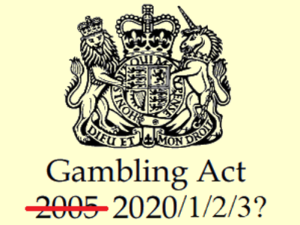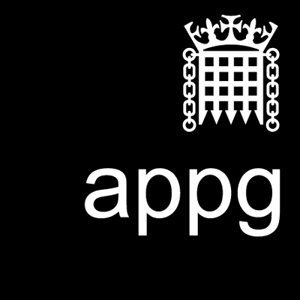Calls To Replace The 2005 Gambling Act With A New Act For The Digital Age Intensify
 It seems as though the world of gambling is in the news virtually every day at the moment, with calls for a new Gambling Act to be introduced growing ever louder. From stories about problem gamblers becoming more numerous through to betting companies being fined for breaching rules put in place to govern them, stories surrounding the gambling industry are rarely in short supply.
It seems as though the world of gambling is in the news virtually every day at the moment, with calls for a new Gambling Act to be introduced growing ever louder. From stories about problem gamblers becoming more numerous through to betting companies being fined for breaching rules put in place to govern them, stories surrounding the gambling industry are rarely in short supply.
A recent report by the Gambling Related Harm All Party Parliamentary Group has outlined what they think needs to happen to bring gambling laws up-to-date, given that the previous Act became law in 2005 and the landscape of betting has changed completely since then. What changes are likely to happen is the biggest question that needs answering.
Why People Think A New Act Is Necessary
 There are a number of reasons why it is felt that a new Gambling Act is a necessity, with the main one being that a proper review of the gambling industry hasn’t been carried out since 2001. That was the responsibility of Alan Budd, who carried out his review working on the premise that there could be a balance found between the need for social protection and the desire to ensure economic freedoms.
There are a number of reasons why it is felt that a new Gambling Act is a necessity, with the main one being that a proper review of the gambling industry hasn’t been carried out since 2001. That was the responsibility of Alan Budd, who carried out his review working on the premise that there could be a balance found between the need for social protection and the desire to ensure economic freedoms.
One thing that Budd could not have easily predicted at the time was the manner in which the growth in the digital world would revolutionise gambling. The move to be predominantly online has meant that controlling and monitoring betting has become so much more difficult than anyone would ever have assumed was possible. That’s to say nothing of the manner in which smartphones and tablets have become so commonplace.
One of the main criticisms of the previous Gambling Act is that too much of it was left for the industry to monitor themselves. It’s felt that the Gambling Commission is no longer fit for purpose, whilst much of the money acquired for the purpose of funding research and treatment is put forward voluntarily and is not considered to be enough. Hardly surprising when you consider that the act mentions the postal service more than the internet.
What The 2005 Act Is Lacking
 The biggest issue with the Gambling Act of 2005 is that it was in no way future-proofed to be able to cope with the introduction of the digital age. That has, according to Tom Watson, led to people being exploited by ‘some operators’, with the regulator unable to do enough to stop that because ‘the legislation that supports the regulator is not adequate’.
The biggest issue with the Gambling Act of 2005 is that it was in no way future-proofed to be able to cope with the introduction of the digital age. That has, according to Tom Watson, led to people being exploited by ‘some operators’, with the regulator unable to do enough to stop that because ‘the legislation that supports the regulator is not adequate’.
Watson is also of the belief that the 2005 Act lacked the ‘space for customer protection’. The Act was intended to have a ‘tripartite relationship’ between the regulator, the advisory board and Gamble Aware, but Watson thinks it failed because the regulator wasn’t able to perform its core function, causing the tripartite relationship to fall apart.
One of Labour’s ideas with the new Act would be to change that tripartite arrangement to instead have:
- The regulator
- A mandatory levy to fund the National Health System
- An ombudsman charged with protecting customers
It is the latter thing that is most noteworthy, given that at present the gambling sector is one of the only ones that does not have a formal ombudsman. The Independent Betting Adjudication Service exists, but it is not a formal ombudsman for the industry.
What A New Gambling Act Cover

According to critics of the current Gambling Act, a new Act will be faced with four major challenges. The first is to decide what its actual premise is. Alan Budd was working off the idea that a balance between protecting people from harm whilst still allowing them to gamble was the most important starting point, but is the same still true for the modern age?
It is that word ‘modern’ that is the most important one, given that one of the biggest changes in the world of gambling has been driven by technology. The likes of data analytics and development of algorithmic intelligence has allowed betting companies to ensure that they have the very best information available to them that isn’t necessarily available to pundits.
The next question for those behind the review of the Act is about its scope. The 2005 Act was, in many ways, too verbose to allow interpretations of the laws that could move with the time. Innovation and change will always be key words in the world of gambling, so keeping the language concise should allow some more room for manoeuvre in the future.
Speed Of Implementation Will Be Key
 It’s something that is simple when you think about it, but not often taken into account when devising new rules and laws. A new Gambling Act is felt by many to be vital, yet the amount of time it will take to come into effect might mean that we’ve got a long wait on before it becomes a reality. Budd released his report in 2001 after more than a year’s research, with the Act becoming law in 2005 and not being totally implemented for another two years.
It’s something that is simple when you think about it, but not often taken into account when devising new rules and laws. A new Gambling Act is felt by many to be vital, yet the amount of time it will take to come into effect might mean that we’ve got a long wait on before it becomes a reality. Budd released his report in 2001 after more than a year’s research, with the Act becoming law in 2005 and not being totally implemented for another two years.
If it takes the same amount of time for a new Act to be implemented then it’s possible that the gambling industry will have changed again and the things the Act looks at will have become obsolete. This could be dealt with by looking at the fourth point, which is scale. If a number of smaller changes to the law are brought in instead of one large Act, it will allow changes to take place immediately and the ability to move with the times.
What The Gambling Related Harm APPG Has To Say
 One of the most influential things on any new Gambling Act will be the findings of the Gambling Related Harm All Party Parliamentary Group. Whilst ensuring a new look at gambling was one of the Labour Party’s main promises ahead of the election in December of 2019, with Tom Watson being one of the strongest voices on the matter, the APPG truly was a united front in a political sense.
One of the most influential things on any new Gambling Act will be the findings of the Gambling Related Harm All Party Parliamentary Group. Whilst ensuring a new look at gambling was one of the Labour Party’s main promises ahead of the election in December of 2019, with Tom Watson being one of the strongest voices on the matter, the APPG truly was a united front in a political sense.
Carolyn Harris acts as the Chair of the group, whilst Iain Duncan Smith Ronnie Cowan, Lord Foster and Sammy Wilson are all Vice-Chairs. This was done in order to ensure the cross-party nature of the exercise. Carolyn Harris said that, “The APPG is not anti-gambling, we support a safe and sustainable industry”. What the group wants more than anything else is better regulation of the gambling industry.
The APPG released a preliminary report in November of 2019 and is expected to release its full report later this year. The initial findings were that a £2 maximum stake should also be introduced to online slot games just as it was to Fixed Odds Betting Terminals located in bookmaker shops. It was also felt that the Gambling Commission is in need of an overhaul. Added to that is is hoped that new rules on gambling advertising will be introduced.
A Balance Is Important
 Tom Watson believed that the most important thing in any new Gambling Act was a better balance. It’s important to ensure that the gambling industry is able to ‘remain profitable’, but that it can do so in a sustainable manner. It also has to be limited in order to ensure that it cannot have ‘market excess’.
Tom Watson believed that the most important thing in any new Gambling Act was a better balance. It’s important to ensure that the gambling industry is able to ‘remain profitable’, but that it can do so in a sustainable manner. It also has to be limited in order to ensure that it cannot have ‘market excess’.
A big part of this is in stopping people from being hurt and exploited. Steps should be taken to stop gambling from leading to ‘individual, social and economic harm’. A big part of that will depend on ‘transparency of terms and conditions and transparency of data’. That includes customers being able to find out what’s happened to their accounts and why.



